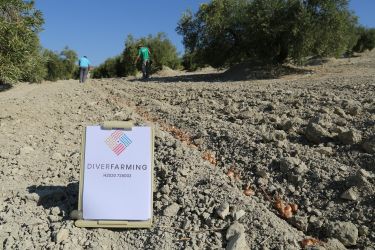The Cordoba team of the European Diverfarming project have begun sowing saffron in the olive grove’s alleys
Andalusian olive groves suffer from the loss of earth. The gullies that rip up the terrain in which the olive trees grow are appearing in more and more plots, leaving the farmers without soil and, therefore, without a productive harvest. The large amount of erosion in these terrains and the low amount of organic matter of the bare soils arise as two of the main causes of run-off damage.
 The European Diverfarming project, financed by the European Commission’s H2020 programme is focusing on this scenario in Andalusian fields. Through crop diversification and low input management practices, the project seeks to increase productivity in these lands by improving the yields from their soils and by reducing costs.
The European Diverfarming project, financed by the European Commission’s H2020 programme is focusing on this scenario in Andalusian fields. Through crop diversification and low input management practices, the project seeks to increase productivity in these lands by improving the yields from their soils and by reducing costs.
The project draws up a diversification map which covers eight different countries and, in the specific case of the olive, has the olive groves of Jaen in its sights. The experimental land, located in Torredelcampo (Jaen), will be used to validate the benefits of introducing crops into what was monocropping. It has a traditional design with 12 x 12 metre frames spread out over three hectares and is crossed by large gullies that leave the olive trees’ roots exposed. The trees in question are of Picual variety. Current management includes intensive tilling, bare soils, mineral fertiliser, pesticides and herbicides.
The introduction of saffron
One hundred and eighty kilograms of saffron bulbs occupy the wide alleys of this olive grove from this very week. The research group of the Departamento de Edafología at the Universidad de Córdoba formed by Luis Parras, Beatriz Lozano and Manuel González has been in charge of designing the sowing and planting the crop, which will be harvested next November.
The soil characteristics have proved ideal for the development of this crop that has a lifecycle of three to four years and which, due to its gastronomic success as well as its health benefits, would help to improve the profitability of the olive grove, providing complementary income.
The practice of no tilling and the use of pruning waste will enable costs to be reduced and the biodiversity and soil quality to be increased. The soil currently stands bare and has a low organic matter concentration. This, coupled with the vegetation cover composed of saffron, will hold the land down and minimise the impact that precipitations have on the terrain.
Two more diversifications
In addition to growing saffron, Diverfarming contemplates two further diversifications for the olive grove. A combination of vetch and oat will be sown in the part adjacent to the saffron alleys in November and a third sowing, in spring, will be of lavender, which will give the olive groves a purple colour.
The University of Cordoba participates in this case study and is joined by ASAJA Región de Murcia and Disfrimur Logística. While the UCO research group will measure the effects of the diversification on aspects such as erosion and productivity of the soil, as well as the environmental impact and the emission of greenhouse gases, researchers from the University of Jaen will perform the study of the value chain of the intercropping in the olive grove’s alleys (saffron, vetch/barley and lavender) to determine their market profitability.
Diverfarming is a project financed by the Horizon 2020 Programme of the European Commission, within the challenge of “Food Security, Sustainable Agriculture and Forestry, Marine, Maritime and Inland Water Research and the Bioeconomy”, which counts on the participation of the Universities of Cartagena and Córdoba (Spain), Tuscia (Italy), Exeter and Portsmouth (United Kingdom), Wageningen (Netherlands), Trier (Germany), Pecs (Hungary) and ETH Zurich (Switzerland), the research centres Consiglio per la ricerca in agricoltura e l'analisi dell'economia agraria (Italy), the Consejo Superior de Investigaciones Científicas (Spain) and the Natural Resources Institute LUKE (Finland), the agrarian organisation ASAJA, and the companies Casalasco and Barilla (Italy), Arento, Disfrimur Logística and Industrias David (Spain), Nieuw Bromo Van Tilburg and Ekoboerdeij de Lingehof (Netherlands), Weingeut Dr. Frey (Germany), Nedel-Market KFT and Gere (Hungary) and Paavolan Kotijuustola and Polven Juustola (Finland).










